



Praxis
RIFFS: Un experimento en la escritura de investigación y publicación sobre música popular
post(s)
Universidad San Francisco de Quito, Ecuador
ISSN: 1390-9797
ISSN-e: 2631-2670
Periodicity: Anual
vol. 4, 2018
Received: 25 June 2018
Accepted: 14 August 2018

Cómo citar: Raine, S., Hamilton, C. (2018). RIFFS: Un experimento en la escritura de investigación y publicación sobre música popular (Juan Pablo Viteri, trad.). En post(s), volumen 4 (pp. 202-208). Quito: USFQ PRESS
Riffs: An experiment in writing about researching, and publishing on popular music
Riffs1 emerged out of a writing group at Birmingham City University. The group, run by Professor Nick Gebhardt, emerged as a space to critically consider the ways in which we communicate research, and to regard writing as an academic skill to be developed and refined, like any other scholarly skill. Our ideas initially found a home on a private blog, where pieces were posted before each writing group session for members to read. As we wrote, we realised that by writing fiction, poetry, or by creating new forms of writing that grew out of our research, we were able to more clearly communicate our observations and ideas about popular music.
Riffs was set up as a space where we could share this writing with others and explore how novel approaches to writing about popular music could take academic understanding and expression beyond our writing group. The participants of the writing group became editorial board members. A couple of us had experience working for online journals, and together we developed a trial-and-error working process, borrowing templates and procedures from other places, while always trying to maintain the possibility for variation and experimentation. For example, our Punk Referencing Policy is: “if it works, use it”. Each issue is based upon a prompt which holds the potential to be interpreted in a range of different ways by scholars working on different areas or genres of music.
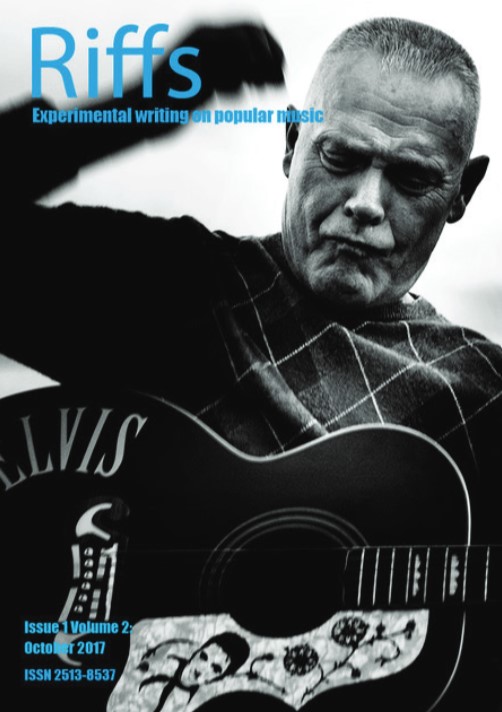
Our first issue, guest edited by Professor Gebhardt, was published in limited edition print and online through an Open Access framework in February 2017. We included two visual pieces from young, independent photographers, and six written pieces that took alternative approaches to researching and writing about popular music. Encouraged by our ability to get stuff done, we asked Dr. Simon Barber (Birmingham City University) to guest edit the next issue on songwriting which was published in October 2017. This issue again pushed the limits of the journal by including visual scores, and by challenging the boundaries between the printed journal and the Riffs website.
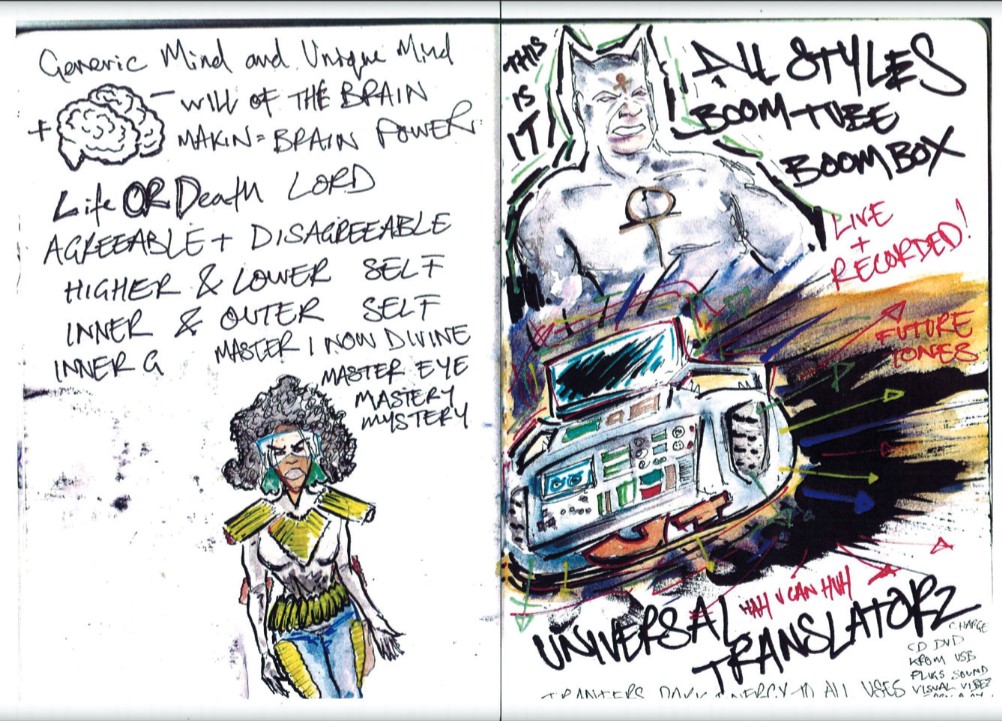
The current issue, guest edited by music and culture writer Laura Snapes (The Guardian, Pitchfork), seeks to explore the relationship between journalistic and academic critique of popular music. Additionally, we are in the process of preparing an issue on sound system and reggae, guest edited by Dr. Simon Jones (Scientists of Sound2). We continue to explore Riffs as a changeable and evolving space which adapts to the topics of each issue. The journal seeks to put contributors from academia and journalism in conversation with each other, while playing with the form of the academic book review, and offering a section on experiential pedagogy in popular music.
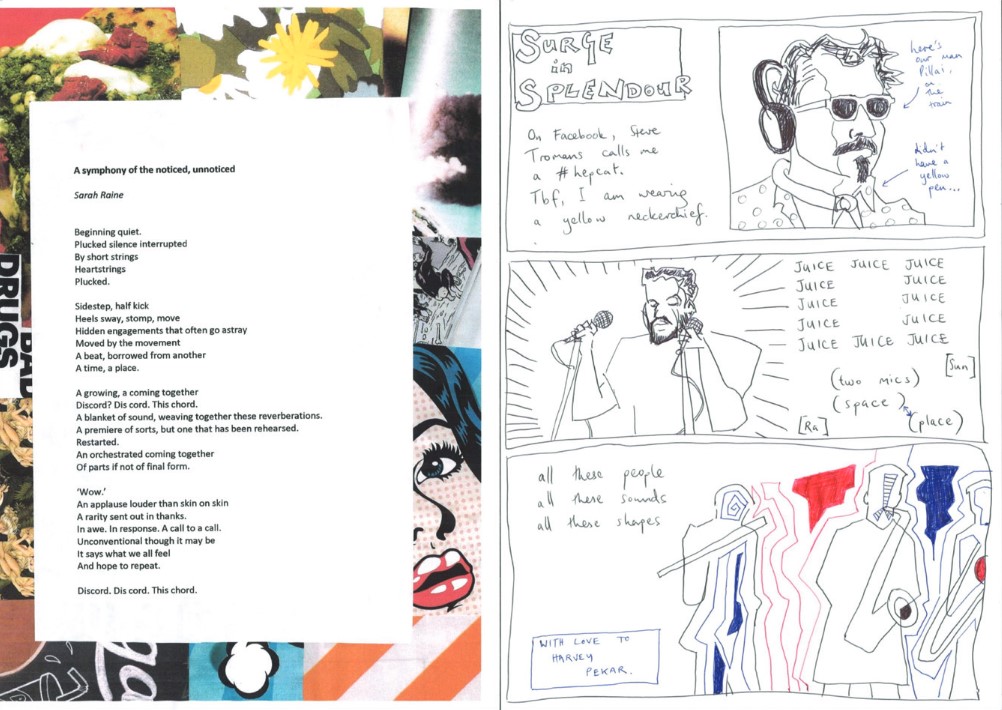
Inspired by our creative and innovative postgraduate support staff (of the PGR Studio3) and by music fandom material culture, the Riffs editorial team have also created zine —special issues which aim to create a physical but sympathetic documentation of happenings, such as conferences (‘Beyond Borders’4 , Birmingham July 2017) and music events (such as ‘Surge in Spring’5, Birmingham April 2017). Armed with A3 paper, magazines, glue, and a trusty photocopier, we commission contributions at the beginning of each event, set a deadline, commission an editorial, and hand out paper copies to event attendees at the end of the day. This provides the opportunity for creating a different visual aesthetic for the journal, and for producing novel critical approaches to music inspired by happenings, put together under time constraints, and reflected upon after, rather than during, the process of publication.
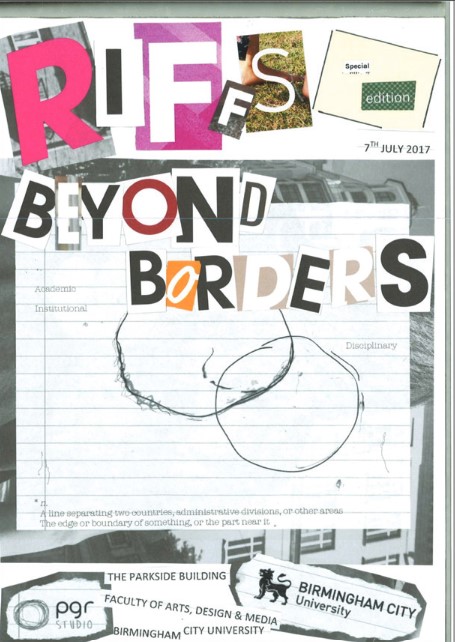
Both the regular issues and the zine special issues push against traditional expectations of academic publishing. As an editorial board, we closely critique and review each contribution to ensure high quality pieces, while also encouraging originality and experimentation in place of editorial policies and style guides. We continue to self-publish and to work with DIY companies to get our journal printed, while ensuring accessibility for everyone and avoiding pay-walls by making the articles openly available for download. We also encourage our students to get involved at every stage of the process; from design and social media to editorial comments on the pieces during review. Now that we have settled into a pattern of publishing, we will again be changing our approach while considering the relationship between the website and the printed copy, the ways in which we can finance the journal long-term without removing access, and by looking more critically at what these experimental approaches to writing and publishing popular music can offer researchers and academic presses alike.
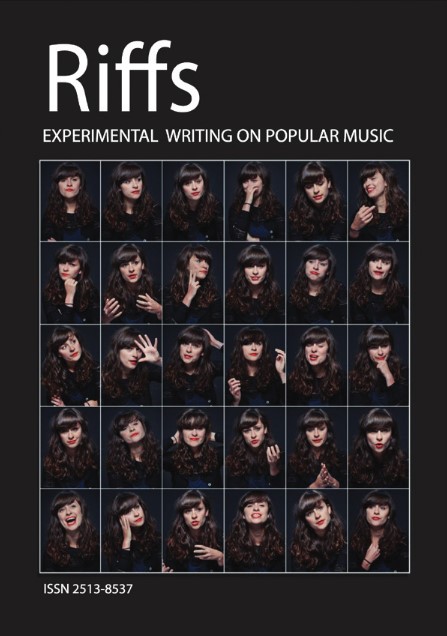
From our experiences so far, doing things differently increases non-academic access to research without reducing the complexity or sophistication of the argument. It brings in non-academic contributors and breaks down the walls between the university and the “real world”. The way that ideas are communicated are wrapped up in the ideas themselves, and become one level of communication and message in themselves. This process makes evident that knowledge comes in a range of different packages, and that it is the insights that we glean from these and their potential application in the understanding of other issues that make research valuable. In short, our approach deals with many of the issues facing academia worldwide – the separation of academics from society, access to knowledge, the limitations of traditional forms of research, and the use of academic writing forms to exclude rather than to communicate.
For us, as popular music researchers, these forms are more than an experimentation. These have become central to the way in which we write about and consider popular music. Indeed, each of us submitted non-traditional doctoral theses, and continue to present and write papers that actively consider means of communication as part of our methodology. In doing so we are confident in writing about complex and, at times, abstract systems (such as music-related Big Data and algorithms), and multi-layered musical experiences (for example, within a multigenerational music scene).
Engaging with music is complex, ever-changing, emotional, and poetic; it entails both our own individual identities, and the identities of others. It involves ideas of and experiences of time and of place. It is always unfinished, ongoing, contradictory, mundane and revelatory. Our proposal is based on the premise that writing about music should engage with all these experiences and convey them to the reader. Riffs is one way to share this message. post(s)
Notes
Additional information
Cómo citar: Raine, S., Hamilton, C. (2018). RIFFS: Un experimento en la escritura de investigación y publicación sobre música popular (Juan Pablo Viteri, trad.). En post(s), volumen 4 (pp. 202-208). Quito: USFQ PRESS

